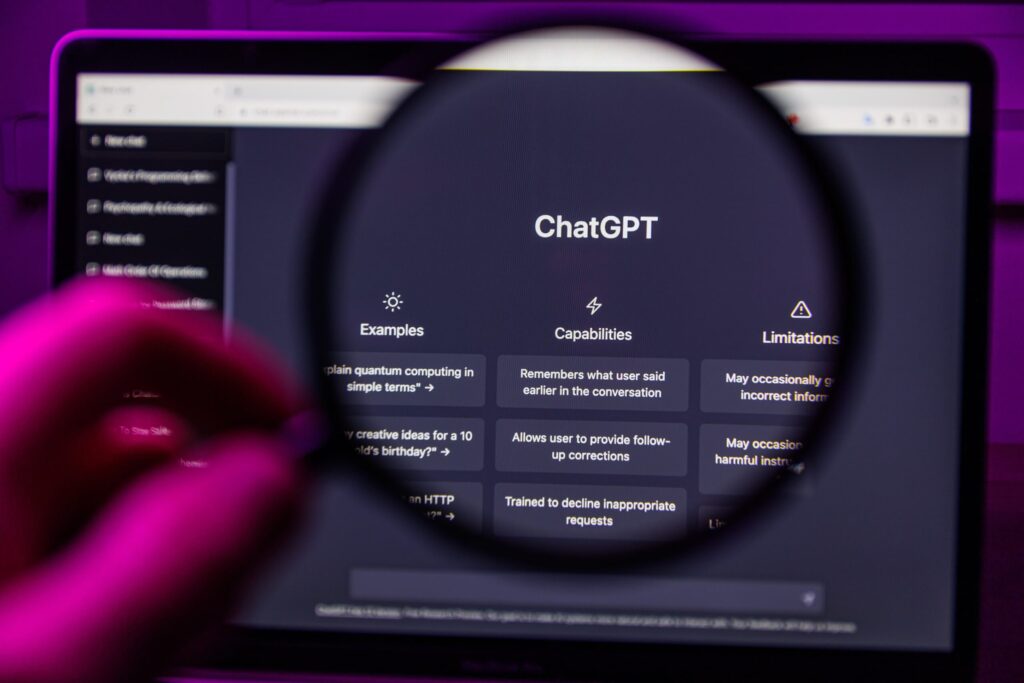
Why ChatGPT for Keyword Research?
Before we jump into the process, let’s talk first about why. ChatGPT AI is not just another keyword tool; it’s a game-changer. It’s a whole new way to understand and harness the power of keywords. ChatGPT AI, powered by OpenAI, can help you uncover hidden keyword gems, analyze trends, and generate content ideas tailored to your niche. It’s quickly becoming a favorite among digital marketers for several compelling reasons:
- Efficiency: Imagine quickly generating accurate keyword suggestions without spending hours on research. This means more time for creating awesome content.
- Versatility: You can use ChatGPT AI for so many SEO tasks, from content creation to competitive analysis, and even brainstorming blog topics.
- Insightful: It’s amazing how much you can learn about your audience’s search behavior.
- Innovative: Staying ahead of the competition is key. With advanced AI, ChatGPT AI keeps you updated on trends and new ranking opportunities.
Getting Started with ChatGPT

If you’ve been wondering how to up your SEO game or need some guidance on keyword research, you’ve come to the right place. To get started, you’ll need access to ChatGPT AI. You can either use the ChatGPT API or interact with ChatGPT OpenAI directly on their platform. Both options are super powerful and will help you with keyword research.
Step 1: Set Your Goal
First things first, let’s get clear on what’s your goal. Are you aiming to boost your website’s traffic, discover content ideas, or outshine your competition? Whatever your goal, keeping it in mind will focus your keyword research effectively.
- Define your primary objective (e.g., increase website traffic, generate content ideas).
- Keep your goal specific and measurable.
- Use your aim to direct your keyword research.
Step 2: Start with Seed Keywords
Think of seed keywords as the roots of your keyword research. These basic terms relate directly to your niche or industry. For instance, if you’re blogging about healthy eating, your seed keywords might be “nutrition,” “meal plans,” or “healthy recipes.” Enter these into ChatGPT and let it work its magic.
- Identify core topics related to your niche.
- Choose broad, fundamental keywords.
- Enter these seed keywords into ChatGPT for a starting point.
Step 3: Generate and Refine Keywords
Here’s where ChatGPT shines. Using those seed keywords, ask ChatGPT to build a list of related terms. It’s like brainstorming with a super-smart friend. Then, dig deeper to find long tail keywords—specific phrases people are searching for, often with lower competition.
- Now use the prompts to ask ChatGPT for related keywords.
- Explore the suggestions thoroughly.
Step 4: Analyze Your Competition
Now, let’s get a little sneaky (in a good way!). Use ChatGPT to analyze what keywords your competitors are ranking for. Ask, “What keywords is [competitor’s website] targeting?” This information lets you determine what works in your area and where you can stand out.
- Identify your top competitors.
- Use ChatGPT to analyze their keyword strategies.
- Look for holes and possibilities in their approach.
Step 5: Create and Optimize Content
With your shiny new list of keywords, start creating content. Use ChatGPT to outline and draft your blog posts or web pages, sprinkling those keywords naturally throughout. Never forget that people should always read your material before search engines! After creating your content, do a final review to ensure your keywords are well-integrated and not overdone.
- Outline your content with ChatGPT’s help.
- Write naturally, incorporating keywords seamlessly.
- Analyze content to ensure it is engaging and SEO-friendly.
Tips for Pro-Level Success
Here are some top tips to help you become a pro at using ChatGPT for keyword research and SEO. Let’s dive in!
- Stay Updated: Always keep up with the latest updates and features of ChatGPT and other SEO tools to stay ahead in the game.
- Experiment: Try different prompts and strategies. Don’t be afraid to try different ways to see what works best for your content and audience.
- Engage Your Audience: Focus on creating engaging and valuable content. Make sure it resonates with your readers and keeps them coming back for more.
- Analyze Competitors: Analyse your competitors’ use of keywords and techniques regularly. Use these ideas to improve your strategy and identify new chances.
- Optimize Continuously: SEO is not a one-time task. Continuously review and optimize your content to ensure it remains relevant, engaging, and effective in ranking well on search engines.
Practical Example: Using ChatGPT for a Blog Post on Travel

Let’s bring everything together with a practical example. Just imagine you are writing a blog on the topic: Planning the Perfect Weekend Getaway.
1. Seed Keywords
- weekend getaways, travel tips, short trips – Seed keywords.
- Start with these core topics that directly relate to your niche.
2. Generate Keywords
- Use ChatGPT to come up with a list of related keywords.
- Prompt ChatGPT: “Please give me keywords related to planning the perfect weekend getaway.
- You’ll get a range of suggestions like “quick travel tips,” “best weekend destinations,” “packing tips for short trips,” and more.
3. Analyze Long Tail Keywords
- Look for specific, low-competition phrases using ChatGPT.
- For example: “budget-friendly weekend getaways”, “family-friendly short vacations,” and “last-minute travel ideas.”
4. Competitive Analysis
- Prompt ChatGPT: Which keywords do the best travel blogs use when targeting weekend trips?
- This helps you find gaps and opportunities in their strategies.
5. Content Creation
- Outline and write the blog post using ChatGPT.
- Ask ChatGPT: Make an outline for a blog post explaining how to plan the perfect weekend getaway.
- Based on the outline, draft sections of your blog, incorporating your keywords naturally.
FAQs

Q1. What are seed keywords and why are they important?
Answer: Seed keywords are your basic terms related to your niche. They’re the starting point for keyword research, helping you and ChatGPT generate a bigger list of relevant keywords.
Q2. How can I use ChatGPT to locate long-tail keywords?
Answer: Long tail keywords are more specific and often less competitive. Ask ChatGPT for detailed keyword suggestions based on your seed keywords, like “best budget travel tips for families.”
Q3. Can ChatGPT help with analyzing my competitors’ keywords?
Answer: Yep! You can ask ChatGPT to find out which keywords your competitors are using. This can give you some great insights and help you spot new opportunities.
Q4. How often should my keyword strategy be updated?
Answer: SEO is always changing, so keep checking and updating your keywords regularly. ChatGPT can help you stay on top of trends and keep your content fresh.
Q5. Is ChatGPT good for SEO beginners?
Answer: Absolutely! ChatGPT is super user-friendly and can help you get started with SEO, making the whole process a lot less intimidating.
Conclusion
And there you have it! Using ChatGPT for keyword research can boost your SEO game and make the whole process a lot more fun. From finding the perfect keywords to analyzing your competition, ChatGPT is a fantastic tool to have in your corner. Remember to keep your content engaging and always write with your readers in mind. So, what are you waiting for? Start using ChatGPT, and may your keywords always lead to great content and higher rankings! Don’t forget to follow Priya Pandit for more interesting and knowledgeable blogs.


